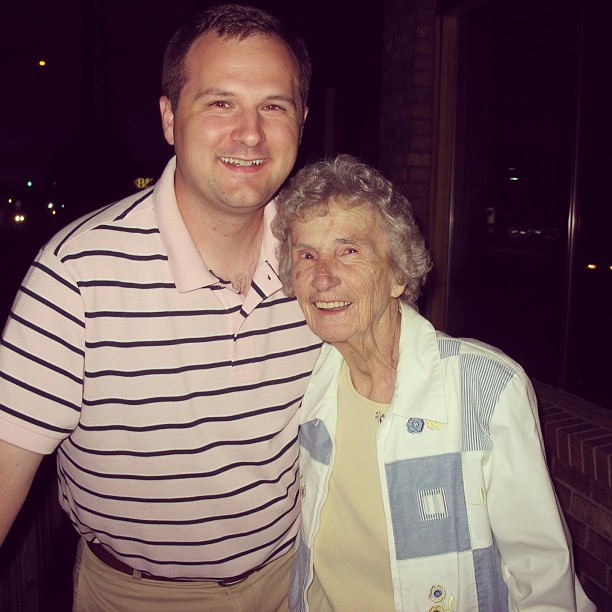FAMILY

It turns out my own impulse as a writer might have been genetic.
We spent the Fourth of July on our bikes. 38 miles total trip, including a morning ride out to the museum with our friend Heather and then a finishing leg out to my parents’ house for an afternoon bar-be-cue. Good food and good times were had by all.
Which brings me to the sixth, Monday, when I flew up to New Jersey for a short trip to visit the family. Nana’s sister Meda was in town from Missouri, as were cousins Tracy and Shannon and Shannon’s boy Jackson. It was one of the best trips I have had in memory.
Nana is doing well. Her age is becoming more and more apparent (although she’s not ancient by any stretch of the imagination–just 83). Sometimes she acts younger, sometimes she acts older. It’s baffling to tell which age she prefers feeling. I suspect dementia is settling in further and further. She’s able to function very normally, although she’s far quieter than she once was in social situations. Her hearing aids have helped a lot, but still, Nana was once the center of many conversations and now she sits on the sidelines. Sometimes she moves very slowly, and sometimes she seems rather helpless, but just a month or so ago, while on a trip to Atlantic City, she negotiated down 21 flights of stairs at a hotel when she’d left her pocketbook in the casino. (Nana is very claustrophobic and hates riding elevators alone.)
When my grandfather died in 1999, every trip to New Jersey suddenly became tainted with the idea that it could be my last time seeing Nana. That wasn’t me being morbid, it was simply my abrupt understanding of the idea that family members, no matter how great they are in a teenager’s eyes, are mortal. At first, it was a very awkward thought–that this could be the last time–and at first it seemed silly. But now, I’ve grown very comfortable and aware of the few days each year I get to spend with her. And I shamelessly attach myself to her, spending my time doting and loving her, holding her hand and kissing her cheek and inviting her to tell the stories she remembers best. They are the same stories she’s told for twenty years now, mostly of when I was younger, and they are just as familiar now as the old house she lives in.
Gone, too, is the raw emotion of talking about my grandfather. Any serious discussion even five years ago of him would send Nana into an emotional state. This past week we were able to go to Delicious Orchards, a wonderful produce market nearby. It was just the two of us, and it was a wonderfully clear and lucid memory day for Nana. I took my time driving her there, and we talked about the past ten years. I asked her if she felt happy, and she talked openly about what her life had been like since my grandfather died. At the orchard, we took our time pushing the cart around every produce display, pausing to admire the tomatoes, trying to figure out what some of the little green and orange objects were. We made sure to buy an apple pie and a cheese danish. Nothing could have made me happier or prouder as her grandson.
All of this will come to an end. I cannot tell if my honest, open-hearted preparation for it is some kind of defense mechanism, or if I am trying to avoid pain, or what. But eventually Nana will pass into the great beyond, and afterward Shirley and Ken might sell the little house in Lincroft and go somewhere else, and everything will be forever different. These times we have now are irreplaceable. And while there’s an overwhelming obviousness to that statement, I feel warm and good about actively seizing the moments I have left in New Jersey.
When my grandfather died (we called him Paps), I was stricken with grief. Growing up, Nana and Paps were very much a safe harbor for me, an idyllic Camelot of love and security and wonder. No matter what displacements were happening in my life, my summers or Christmases in New Jersey were when I could find a mooring, a solid connection, to land.
Recently, my family began the process of exploring the files my grandfather kept in his home office. It turns out my own impulse as a writer might have been genetic.
Paps kept everything. While there is no diary or journal to speak of, his files include a paper trail that establishes clear steppingstones defining my grandfather’s character. Among the best parts: a few reflective essays he wrote after he retired; a thick collection of correspondence from his days working with John Wiley & Sons publishers, including his first job offer from the company in the 1940s and its salary of $3,000 per year; his induction papers from when he entered the military during World War II; a telegram sent to him while he was overseas informing him of his daughter (my aunt) Shirley’s birth; a letter written to my own father in 1968, which began as a compliment for improving his school grades but then ventured into a kind of life-long advice column–and which had never before been seen by my father until a few weeks ago; and a trove of silly drawings and cards and notes from all of his grandchildren, including two letters from me that were sent in 1991.
(Is it really any surprise that I became an English major? Did I have another choice?)
My grandfather was a wonderfully good man. He had kind eyes. He married well. He loved Nana, and Nana loved him. And every fiber of paper in those files confirmed all of the idealizations I’ve attributed to my grandparents. No one is perfect, and real life is indeed messy, but I have grown to accept that Nana is right when she says (every time I come to visit), “I have the best family in the world.” Family is the theme sown through my grandfather’s life–he even mentions it in a copy of a speech I found, in which he was talking to the employees at Wiley and encouraging them not to unionize. He mentioned his first interview at Wiley and how much the company had always resembled a family to him, even from day one. He knew that was the right way to go.
Thursday came too quickly, and I found myself lazily enjoying my last morning of this summer trip to Lincroft. We had coffee and read the newspaper on the patio. Nana and I sat and talked, and she smoked cigarettes and remarked at how cool it was for a July morning. We closed Paps’s files back up and put them back in the banker’s boxes in the dining room, and I carried my suitcase downstairs and loaded it into the rental car. Time to catch my plane in Newark. Closing those file folders, though, and seeing them all stacked up in boxes gave me great inspiration to keep writing, to keep recording the minuscule details of life. Not that they are important or that I am by any means important, but in the hopes that some day someone else will get to know this life a little better.






Leave a Reply